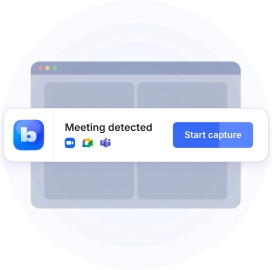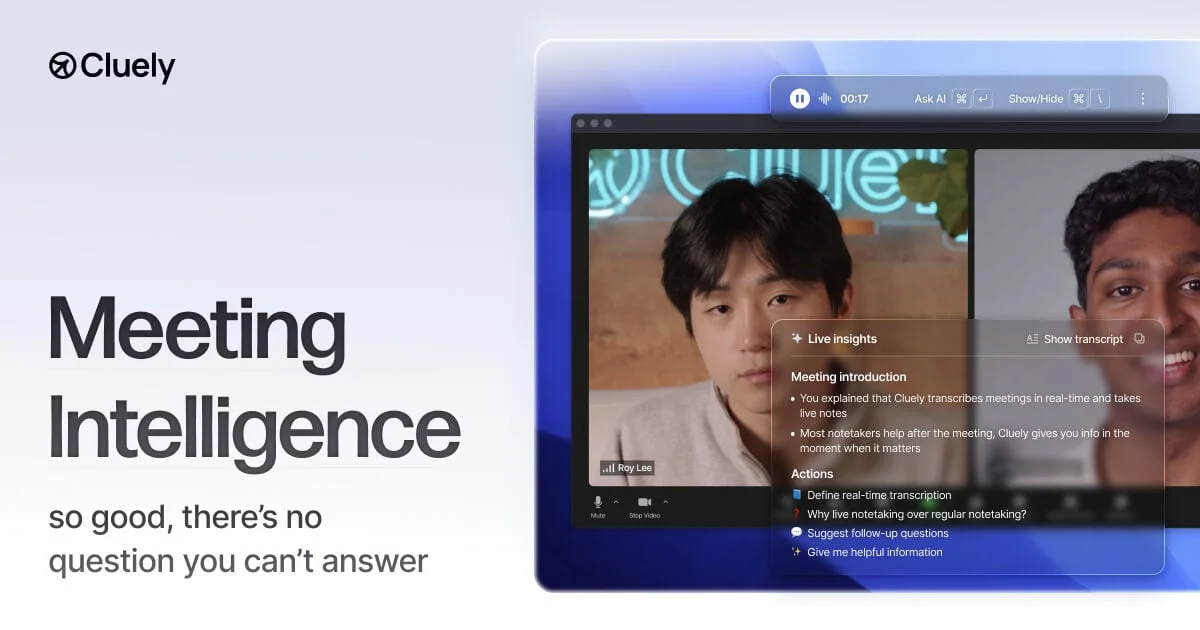
It seems like we live in the golden age of AI productivity, as the AI market shows no signs of slowing down. There's a new tool dropping each week, each one eager to automate yet another part of our working lives.
First came scheduling bots, then inbox cleaners, and now we’ve reached the inevitable, and unsettling next stage: AI that doesn’t just keep track of every meeting, but is more than willing to take the lead.
This isn’t a polite AI notetaker lurking quietly in the background of your calls. Ominously enough, Cluely is an AI powered tool promising to help you... cheat your way through sales calls, job interviews, and exams, actively capturing every utterance, parsing tone and context, and generating action items in front of your eyes.
It’s meeting intelligence on steroids: a silent participant with perfect recall and a knack for drawing conclusions you may or may not agree with.
The leap feels logical in the arms race of productivity software, yet there’s something undeniably dystopian about letting an algorithm dissect your words and intentions in real time, let alone the company's marketing practices.
In this Cluely review, we’ll unpack Cluely’s features, pricing, strengths and weaknesses of the AI app itself, question the legality and ethical consequences, and close with a verdict (and an alternative) you'd probably be safer with.
What is Cluely?
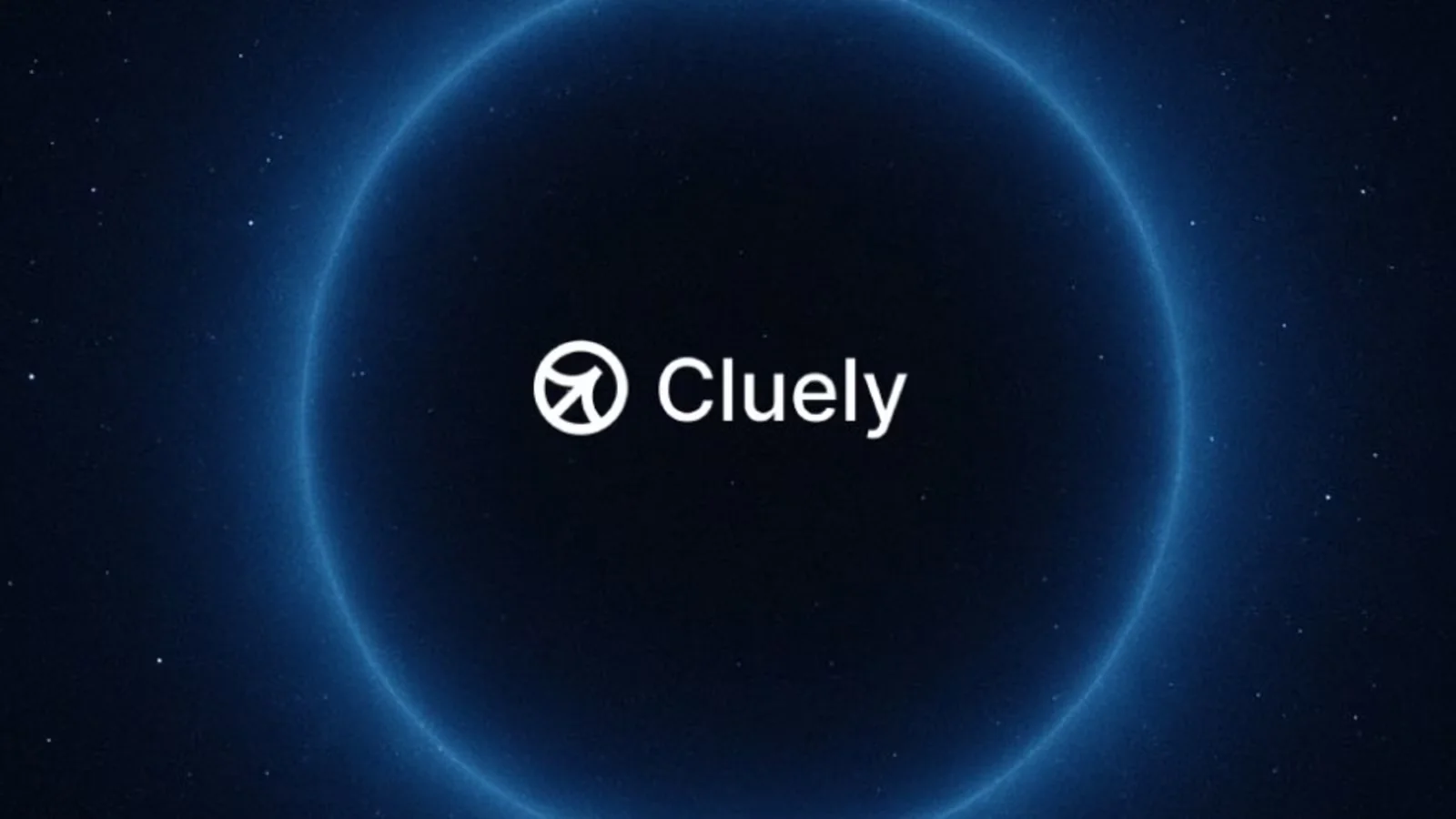
Cluely’s Troubling Backstory
If Cluely were merely another over-eager meeting bot, the story would end with product specs and pricing tables. But the company’s origins, and its founder’s philosophy, make it impossible to treat this AI tool as just another competitor in the productivity arena.
Cluely was created by Chungin “Roy” Lee, a former Columbia University student who openly boasted of outsourcing nearly all of his coursework to generative AI and building tools to cheat on remote job interviews and exams. Columbia placed him on disciplinary probation for promoting academic dishonesty. Investors, unfazed, poured $5.3 million into his next idea: an AI assistant that can sit in on calls, monitor your screen, and feed you real-time prompts so you can glide through sales pitches, job interviews, or college tests without breaking a sweat. The full story is detailed in The San Francisco Standard.
From Help to Hustle
Cluely’s own marketing embraces this subversive streak. One ad famously dramatizes a date where the user secretly receives AI-generated lines, hardly a subtle metaphor for deception. The company’s early manifesto promised users they would “never have to think alone again,” and its roadmap talks casually about moving from browser extensions to wearables and, eventually, “inside your brain.” Whether tongue-in-cheek or not, the message is clear: outsourcing thought isn’t a side effect; it’s the goal.
Why It Matters
Critics warn that Cluely blurs the line between augmentation and outright fraud. Recording calls without consent can be illegal in many countries. Passing off AI-generated responses as your own in exams or professional settings is both dishonest and, in some cases, strictly illegal. Far from a neutral productivity tool, Cluely normalizes covert assistance and erodes trust in workplaces and classrooms alike.
Key Features and Capabilities
✍️ Overall, Cluely delivers some remarkable power: real-time custom prompts, context awareness, automated summaries. But many of its most notable features come with trade-offs, not just in cost or performance, but in privacy, ethics, and risk. So, let's see what a self-proclaimed cheating tool has to offer.
Invisible Overlay Coaching & Stealth Mode Assistance
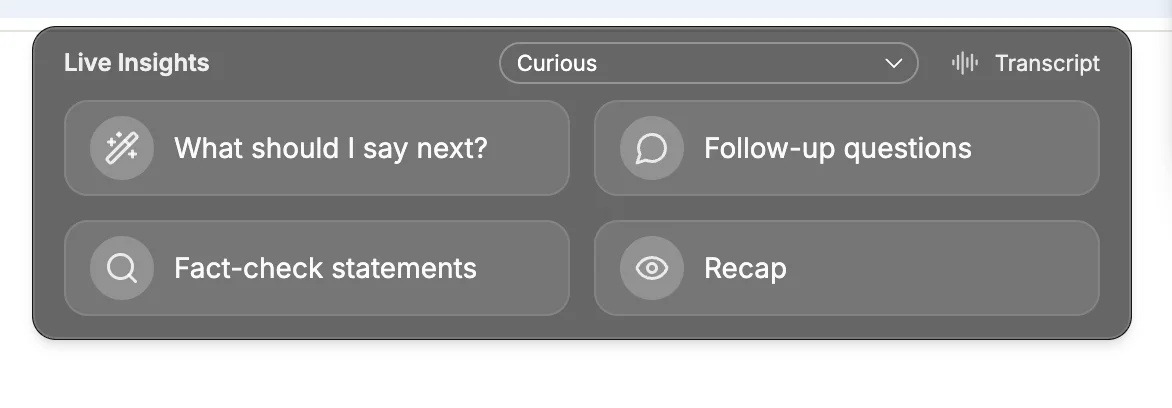
Cluely’s marquee feature is its hidden overlay: a floating widget visible only to you that sits over your screen, actively listens to your mic and watches your screen content, giving you suggestions, answers, talking points and all-in-all live coaching.
It is a hidden AI tool designed as a digital cheat sheet, remaining invisible during screen sharing or recordings, meaning others in the meeting won’t see the overlay. These stealth tactics are central to Cluely’s branding, advertising itself as undetectable forever.
Real-Time, Context-Aware Responses
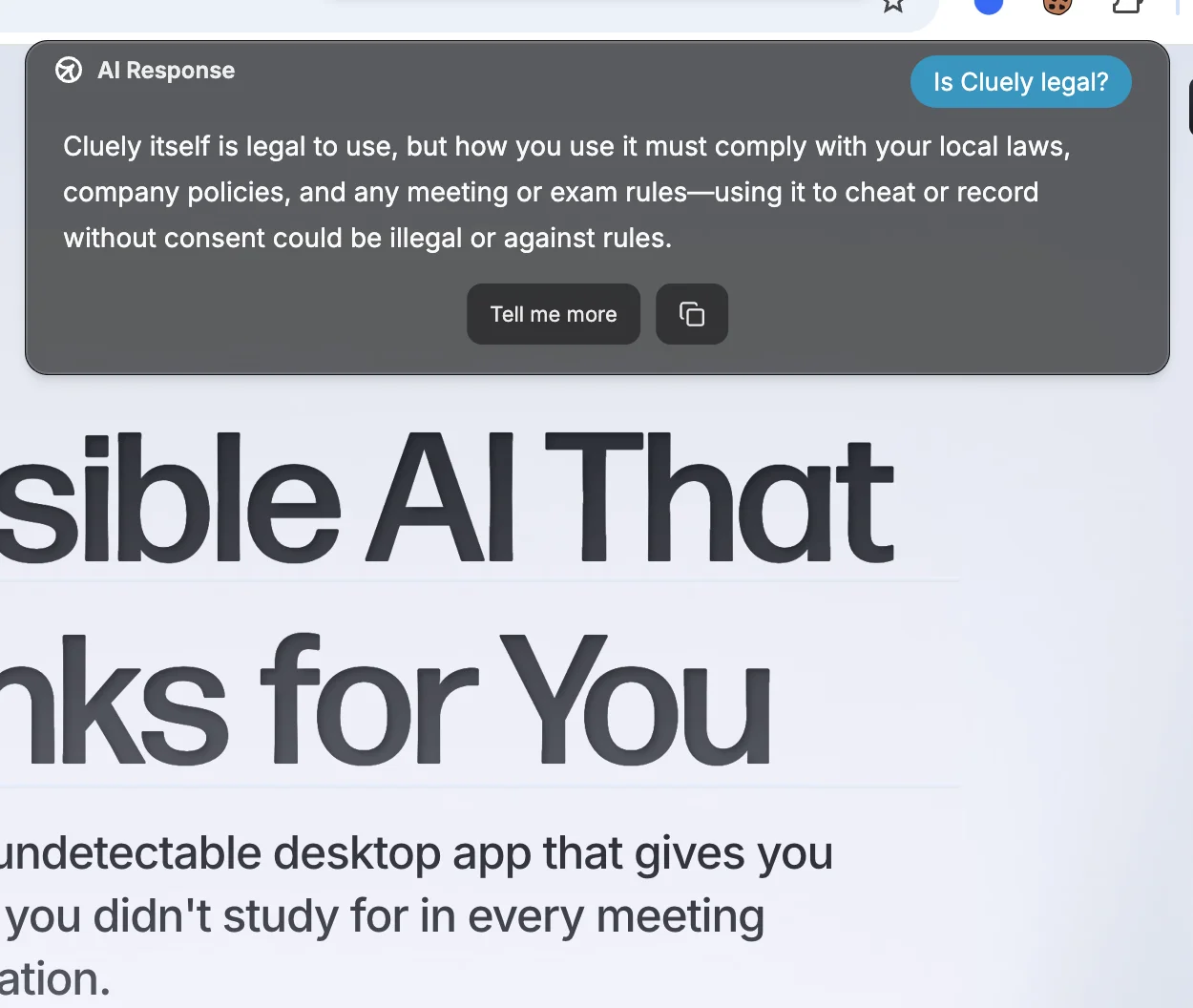
Cluely doesn’t wait until after the meeting to produce summaries. Instead, Cluely listens and uses speech-to-text + OCR (optical character recognition) on audio and screen content to detect what’s happening (e.g. a code editor, a slide deck, or a chart) and then suggests what to say or ask, mid-conversation.
This means that during, say, technical interviews or sales calls, Cluely might prompt you with rebuttals, instant answers and suggested responses, or flesh out points you might have missed and cue you to refer to product details.
Customization: Playbooks & Prompts

Cluely lets users set up “playbooks” or scenario templates (e.g. interviews, sales calls, exam scenarios, customer facing roles) with custom prompts.
You also have the option to upload documents (product brochures, technical specs, etc.) that Cluely can draw on for context during a meeting. In some cases (per external reviews), these features are stronger on paid tiers; free versions often limit what you can ask for in real-time suggestions or how detailed those suggestions are.
Post-Meeting Outcomes & Analytics
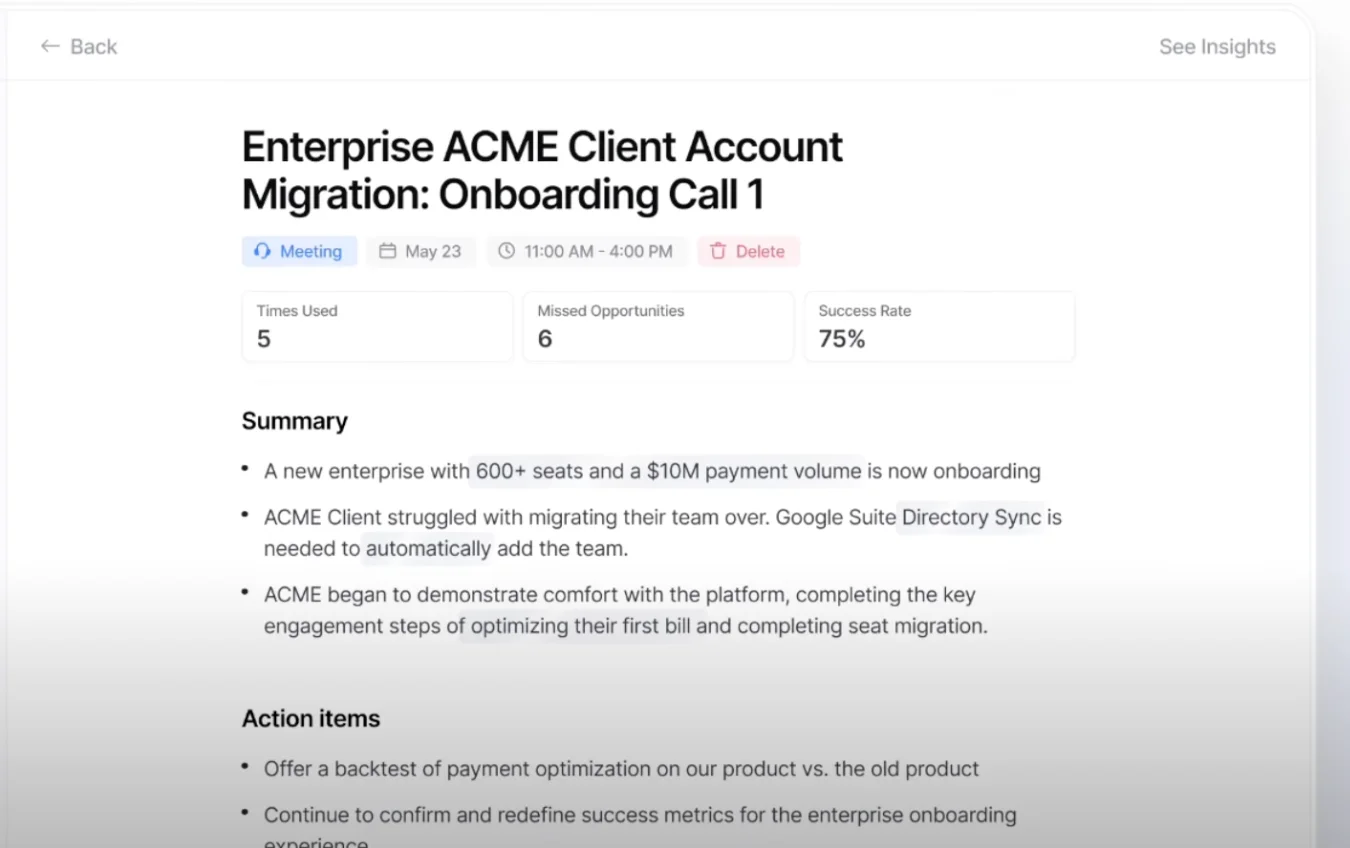
You can also use a chat-like interface (within Cluely) to ask follow-up questions, generate emails to send after a meeting, or regenerate summaries in different forms, much like your usual AI assistant.
How Much Does Cluely Cost?

Cluely’s pricing looks straightforward at first glance, and it does not raise any serious concerns.
The Starter plan is a free tier that includes unlimited real-time note-taking, basic AI responses (capped per day), and the ability to upload files or ask questions about past meetings.
The Pro tier costs $20 per month, unlocking unlimited AI responses, access to the newest language models, and priority support.
Above that sits an Enterprise package with custom pricing, role-based access, SSO/IDP integration, and post-call coaching features aimed at large teams.
On paper, those numbers are competitive. A free tier with meaningful features and a $20 all-you-can-eat premium plan undercuts many mainstream AI note-takers. But when you factor in Cluely’s security record, the “real cost” looks very different.
The Hidden Price of Broken Trust
In mid-2025, Cluely suffered a massive data breach that exposed the personal information, interview transcripts, and even screenshots of more than 83,000 users. Hackers from the group Ivy Dark Agent said the intrusion required no sophisticated exploit: Cluely’s developers had left an admin password file in a public GitHub repository. That single oversight, combined with weak GraphQL protections and a client-side paywall check, handed attackers unrestricted access.
For a company that goes by the “Cheat on Everything” devise, this failure feels less like bad luck and more like inevitability. Storing financial details or sensitive meeting data with a startup that treated basic security as optional is a gamble few professionals should take.
Yes, $20 per month is cheap. But if your notes, client calls, or job-interview transcripts end up in a public dump, the ethical and professional consequences will cost far more than any subscription ever could.
Pros and Cons of using Cluely
Cluely packages a tempting mix of high-tech convenience and covert AI power. Below are the key advantages, and the serious trade-offs, you should weigh before installing it.
👍 Pros
✅ Real-Time Assistance
Cluely’s defining strength is live, context-aware help. During your interviews, sales calls or exams, it monitors audio, scans your screen, and generates on-the-spot answers or talking points, offering real time coaching when needed. For users facing high-pressure scenarios where performance matters, it can really serve as a life-saver.
✅ Invisible Operation
Its stealth overlay stays hidden from other participants and even from most screen recorders. You can summon prompts and summaries without tipping anyone off, which, ethically fraught as it is, is undeniably effective.
✅ Confidence & Performance Boost
By whispering answers and reminders mid-call, Cluely can make you appear calmer and more prepared, which many users say translates into better performance and sharper responses.
👎 Cons
❌ Severe Ethical & Privacy Risks
Because Cluely records conversations and is not easily detectable, it can violate transparency laws in many countries, and workplace policies. Its design encourages recording without informed consent, an ethical red flag.
❌ Misuse & Dishonesty
The tool is marketed for “cheating,” enabling users to pass interviews or exams without the required skills, undermining trust,fair assessment and bypassing professional standards.
❌ Security Breach History
A 2025 hack exposed data from over 83,000 users after developers left database credentials on a public GitHub repo, proof that your sensitive information may not be safe.
❌ Data-Protection Liabilities
Covert recording and hidden AI coaching may breach data-protection rules (like GDPR) or company compliance policies, putting users at real legal risk.
❌ Performance Drawbacks & Skill Erosion
Latency and off-target prompts can distract rather than help, and relying on automated answers and oveall AI fakery hinders true learning and skill development.
Cluely: Legal Grey Areas and Other Ethical Concerns
Yes, sure, Cluely’s slick marketing might frame it as harmless “meeting intelligence,” but the way the product operates places it squarely in a high-risk option category for anyone who cares about compliance or reputation.
By design, Cluely joins live conversations invisibly, records every word, and feeds the user real-time coaching and suggested answers.
That stealthy approach can collide with privacy regulations that require lawful data processing, such as the EU’s GDPR or California’s CCPA, where explicit consent from other parties is mandatory.
Legal experts warn that covertly recording calls or using undisclosed AI prompts during interviews or exams could even violate fraud statutes in some jurisdictions.
A hiring panel, a professor, or a potential client who later learns you used an algorithmic whisperer might argue you misrepresented your abilities. If you’re formally caught, the fallout could be career-ending, loss of job offers, revoked certifications, or blacklisting from professional networks.
The most harm may not land on the user alone. Imagine a competitive job interview where Cluely’s invisible coaching helps one candidate outshine the rest. That hidden edge can hurt others chances and trust in any fair assessment and regulated process.
Even when no explicit law is broken, companies often have strict compliance policies; using Cluely could breach internal codes of conduct and get you terminated.
In short, the Cluely legal landscape is murky. The product’s stealth and ambition make it a potentially risky companion for anyone who values privacy, transparency, and professional credibility.
For those unwilling to gamble on consent loopholes and grey ethical zones, the smartest move might be to leave Cluely out of the meeting altogether.
Who Should (and Shouldn’t) Use Cluely
Cluely is an AI-powered tool marketed as a secret weapon for anyone facing high-stakes conversations, but its usefulness and risk depend heavily on context.
In fast-moving sales environments, a sales team under pressure to close as many deals might be tempted by Cluely’s real-time coaching and instant note-taking.
For internal brainstorming or casual client chats where all participants consent, the software can indeed help capture details and suggest next steps. Tech founders or small startups experimenting with productivity hacks might also find value when transparency isn’t an issue.
That's just about where the safe zone ends. Anyone working in regulated industries such as finance, healthcare, or law should steer clear. These fields have strict compliance rules that demand documented consent and fair representation of skills.
Using Cluely during a technical interview to feed you answers, or during an exam to shortcut genuine knowledge, crosses not only ethical lines but may violate employment contracts or professional codes.
Final Verdict
In a world increasingly wary of covert surveillance and algorithmic deception, Cluely’s slick promises come at awkward timing. The app’s free plan and $20 Pro tier might look enticing next to competitors, but the real cost lies in its legal grey area.
Hidden recording and stealth AI prompts raise serious questions about data processing transparency and consent. Regulators and employers are paying closer attention, and anyone using Cluely in interviews or sales calls risks breaching workplace policies or even facing allegations of fraud.
The company’s history only deepens the concern. A massive data breach already undermined trust, proving that “Cluely legal” is not just a marketing hurdle but a real professional risk. While coaching for sales teams can boost performance, it’s a high-risk option with no safety net if you’re formally caught.
Those seeking productivity gains have better alternatives, AI note-takers that operate transparently and comply with privacy laws.
Are There Better Alternatives to Cluely?
Absolutely! Bluedot stands out as a strong counterpoint to Cluely for anyone looking for AI meeting tools without the shady ethical trade-offs. Check this guide if you're looking for a detailed comparison of the 9 best AI note-takers.
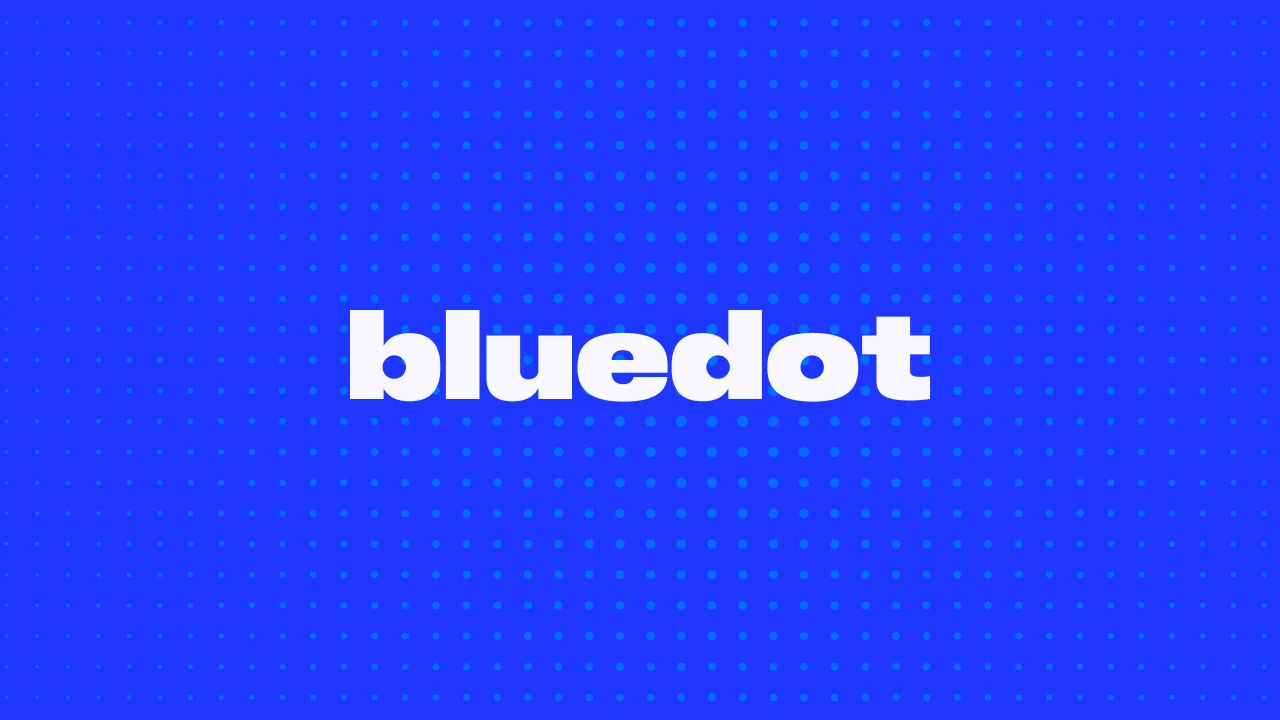
Unlike Cluely, Bluedot doesn’t use hidden overlays or invisible coaching during live meetings. Instead, it captures meetings (with or without screen recordings), transcribes and summarizes them, and integrates cleanly with CRMs and other third-party tools, like Notion and Slack.
For those in sales environments, Bluedot helps document sales calls clearly, sync call summaries automatically, and offer action items, all while being forthright about what is recorded and what isn’t.
There is a free plan to get started, so you can test its features without being locked into anything seemingly suspicious.
If you care about keeping everything above board: highly accuate transcription, fair representation of your skill and legal clarity, Bluedot is a compelling choice. It sidesteps many of the pitfalls Cluely embraces and delivers privacy, consent, and usefulness with integrity.


.png)


